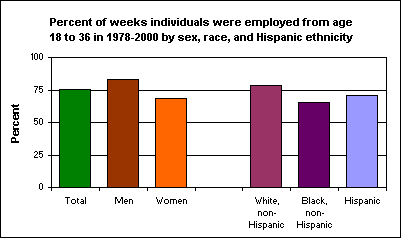September 17, 2002 (The Editor’s Desk is updated each business day.)
Young boomers employed in three-quarters of weeks from age 18-36
The average individual born from 1957 to 1964 was employed during nearly 76 percent of their weeks from age 18 to age 36.

[Chart data—TXT]
Generally, men spent a larger percent of weeks employed than did women (83 percent versus 68 percent). Women spent much more time out of the labor force (27 percent of weeks) than did men (11 percent of weeks).
The amount of time spent employed differs substantially among racial and ethnic categories. Blacks spent 65 percent of weeks employed, while Hispanic workers spent 71 percent of weeks employed. Whites spent 78 percent of weeks employed.
The estimates in this release were obtained using data from the first 19 rounds of the
National Longitudinal Survey of Youth 1979 (NLSY79). The NLSY79 is a nationally representative sample of 12,686 young men and women who were 14 to 22 years of age when first surveyed in 1979; they would be age 36 to 44 today. For more information see "Number of Jobs Held, Labor Market Activity, and Earnings Growth Among Younger Baby Boomers: Results from More Than Two Decades of a Longitudinal
Survey," news release USDL 02-497
Of interest
Spotlight on Statistics: National Hispanic Heritage Month
In this Spotlight, we take a look at the Hispanic labor force—including labor force participation, employment and unemployment, educational attainment, geographic location, country of birth, earnings, consumer expenditures, time use, workplace injuries, and employment projections.
.
Read more »
|
